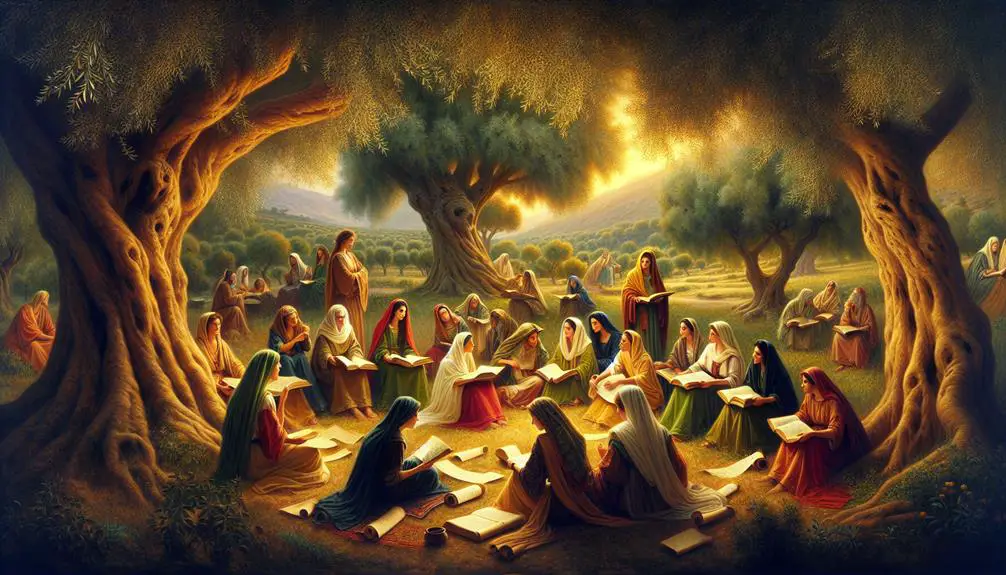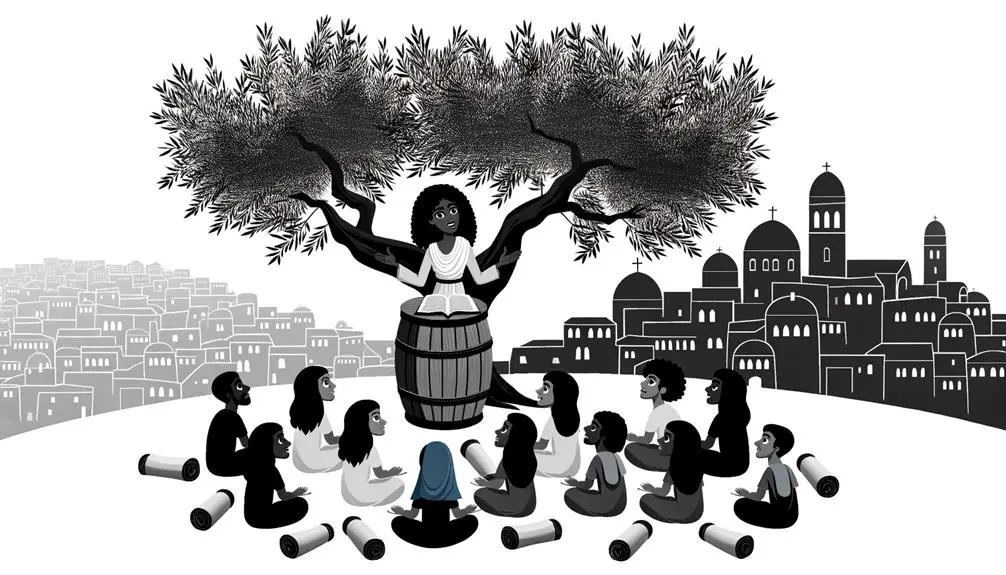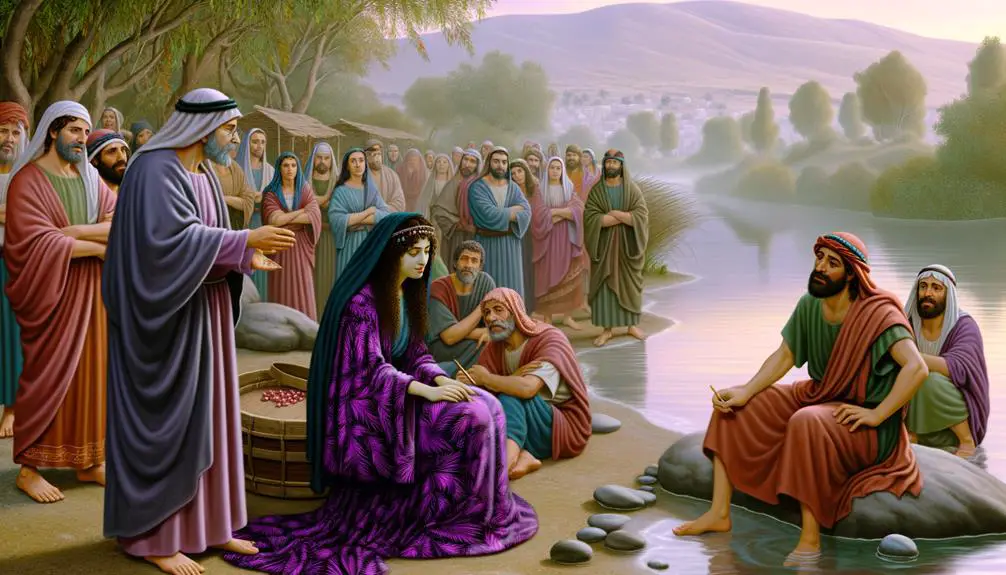Learn about the overlooked female apostles in the Bible and how their stories challenge traditional views of early Christian leadership.

Female Apostles in the Bible Scripture
You might not be aware, but the Bible mentions female apostles, challenging traditional interpretations of scripture.
For instance, Junia is recognized as an apostle by Paul in his letter to the Romans, a fact that has sparked considerable debate among scholars and theologians.
As you explore the roles of Phoebe, Priscilla, Mary Magdalene, and Lydia, you'll uncover a nuanced perspective on women's contributions to the early Christian church.
Their stories, often overshadowed by their male counterparts, offer a compelling insight into the foundational moments of Christianity, encouraging a deeper look into the scripture's portrayal of leadership and discipleship.
Key Takeaways
- Junia, Priscilla, and Mary Magdalene are acknowledged as apostles, highlighting women's pivotal roles in early Christianity.
- Their apostolic status challenges traditional gender norms and underscores female leadership within the Christian faith.
- Historical and textual evidence supports the significant impact and leadership of women like Junia, Priscilla, and Mary Magdalene.
- The recognition of female apostles in the Bible underscores the diverse and essential contributions of women in the formation of Christian communities.
Junia: The Apostle Paul's Contemporary

Among the early Christian community, Junia stands out as a notable apostle who Paul acknowledges as his contemporary, thereby highlighting her significant role in the spread of Christianity. Junia's identity has been the subject of extensive scholarly debate, primarily focusing on her gender and apostolic standing within the early Church. The conversation around Junia not only sheds light on her contributions but also reflects broader discussions on the role of women in the early Christian movement.
The apostolic debate surrounding Junia hinges on interpretations of Romans 16:7, where Paul refers to Junia and Andronicus as 'outstanding among the apostles.' This phrase has been scrutinized to understand whether it means Junia was esteemed by the apostles or was herself an apostle. The majority of contemporary scholarship leans towards the latter interpretation, affirming Junia's apostolic status and thus challenging traditional gender roles within ecclesiastical hierarchies.
Furthermore, the analysis of Junia's identity involves examining the historical and textual evidence that confirms her female identity, against earlier translations that masculinized her name to Junias. Recent scholarship overwhelmingly supports the reading of Junia as a woman, reinforcing her as a pivotal figure in early Christianity.
The debate over Junia's apostolic role and identity not only highlights her importance but also encourages a reevaluation of women's contributions to the foundational stages of Christianity. By recognizing Junia as both a contemporary of Paul and a fellow apostle, the discussion opens up broader questions about gender, leadership, and recognition in the early Church, offering a nuanced understanding of early Christian dynamics.
Phoebe: Deacon and Benefactor

How does Phoebe's role as a deacon and benefactor challenge traditional narratives about women's positions in early Christian communities? The answer lies in the recognition of her significant contributions, as documented in the New Testament. Phoebe's mention in Romans 16:1-2 by Paul not only as a deacon but also as a benefactor to many, including Paul himself, underscores her indispensable role within the early church. This Roman commendation disrupts the often-held belief that women were peripheral in early Christian leadership and ministry.
Phoebe's designation as a deacon places her within the sphere of church roles typically reserved for men in traditional interpretations. The term 'deacon' here signifies a person entrusted with specific responsibilities, possibly including leadership and administrative tasks, which suggests a level of authority and respect within the community. Her role transcends mere service; it embodies leadership and stewardship, challenging the notion that early Christian leadership was exclusively male.
Furthermore, Phoebe's role as a benefactor is equally significant. Her financial and logistical support for the church and for Paul's missions indicates a position of wealth and influence. This aspect of her ministry highlights the essential, yet often overlooked, contribution of women in sustaining the early Christian movement.
Priscilla: Teacher and Evangelist

Priscilla, alongside her husband Aquila, emerges as a pivotal figure in the New Testament, embodying the roles of both teacher and evangelist with notable distinction. Their partnership is a testament to the significant contributions women made in the early Christian community, challenging traditional gender roles of the time. The Aquila partnership, deeply rooted in mutual respect and shared mission, becomes a powerful vehicle for spreading the teachings of Jesus.
In the context of their Rome ministry, Priscilla's role is particularly noteworthy. The expulsion of Jews from Rome under Emperor Claudius forced Priscilla and Aquila to relocate, yet this didn't deter their evangelistic efforts. Instead, it broadened their impact, as they established a church in their home, which became a crucial hub for Christian teaching and fellowship.
Priscilla's scholarly and objective contributions to theological discourse are evident in her interaction with Apollos, an eloquent speaker and devout Jew. Detecting the gaps in his understanding of the gospel, Priscilla and Aquila took him aside and explained 'the way of God more accurately.' This episode not only highlights Priscilla's deep understanding of Christian doctrine but also her role as a teacher who corrected and guided with humility and wisdom.
The narrative of Priscilla underscores the vital role women played as leaders within the early Christian community. Her legacy, characterized by a profound partnership with Aquila and a courageous ministry in Rome, offers a compelling argument for the recognition of female leadership and authority in the religious sphere. Through her teaching and evangelism, Priscilla exemplifies how women have been instrumental in shaping the Christian faith from its inception.
Mary Magdalene: First Witness to the Resurrection

Mary Magdalene's pivotal role as the first witness to the Resurrection marks a cornerstone moment in Christian narrative, underscoring her significant contribution to early Christian testimony. Her encounter with the risen Christ, as recounted in the Gospels, not only elevates her status within the early Christian community but also challenges contemporary norms regarding witness credibility. Traditionally, women's testimonies were undervalued in legal and religious contexts. Yet, Mary Magdalene's primary witness to this seminal event directly confronts and subverts these societal biases, highlighting a radical inclusion and validation of women's experiences in early Christian teachings.
Analyzing the Resurrection implications through Mary Magdalene's testimony further reveals the transformative power of this event within Christian theology. Her firsthand account provides a critical foundation for the belief in Jesus's victory over death, affirming the core of Christian faith. This narrative choice, to place a woman at the heart of such a crucial moment, not only emphasizes the importance of witness credibility irrespective of gender but also signals a broader theological and societal message. It suggests a reevaluation of roles and contributions within the early Christian community, advocating for a more inclusive recognition of leadership and testimony.
Consequently, Mary Magdalene's role transcends her singular experience, reflecting broader implications for understanding early Christian identity and practices. Her witness to the Resurrection, therefore, isn't merely a historical footnote but a testament to the evolving dynamics of early Christian witness credibility and the profound theological implications of the Resurrection narrative.
Lydia: Early Church Patron

While Mary Magdalene's encounter with the risen Christ underscores a pivotal moment of witness and inclusion, Lydia's role as an early church patron reflects another dimension of women's integral involvement in the formation and support of the early Christian community. As Thyatira's merchant, Lydia's conversion story serves as a compelling narrative demonstrating the economic and social influence women could wield in the nascent Christian movement.
- Economic Influence: Lydia was a dealer in purple cloth, a luxury product that denoted wealth and status in the Roman world. Her profession not only highlights her considerable economic influence but also suggests she possessed a network of contacts that could be invaluable for the spread of Christianity.
- Conversion Story: Lydia's conversion and subsequent baptism, as recounted in the Acts of the Apostles, mark a significant moment in the Christian tradition. Her openness to Paul's message and her immediate response to be baptized, along with her household, underscore the personal and communal dimensions of faith conversion in the early church.
- Patronage of the Early Church: Following her conversion, Lydia offered her home as a meeting place for Paul and the early Christians. This act of patronage was crucial in providing a safe haven for the fledgling Christian community and underscores the indispensable role of hospitality and support in the growth of early Christianity.
Lydia's story illuminates the multifaceted roles women played as patrons, leaders, and influencers in the early Christian community. Her economic independence, combined with her faith commitment and generosity, exemplifies the critical support network that enabled the spread and establishment of Christianity in its formative years.
Frequently Asked Questions
How Has the Interpretation of Female Apostles' Roles in the Bible Scripture Evolved in Modern Biblical Scholarship?
In modern biblical scholarship, the interpretation of apostles' roles, especially regarding gender, has significantly evolved. Scholars now delve into gender linguistics and apostolic symbols to uncover nuanced understandings. They analyze texts with a critical eye toward historical and cultural contexts, leading to a broader acknowledgment of women's roles in early Christianity.
This shift reflects an effort to reevaluate traditional narratives and embrace a more inclusive historical perspective.
Are There Any Non-Canonical Texts That Provide Additional Insights Into the Lives and Ministries of Female Apostles Mentioned in the Bible?
You'll find that non-canonical texts, like the Gnostic Gospels and Apocryphal Acts, provide fascinating insights into early Christian figures. These texts often present alternative views and stories not found in the canonical Bible.
They delve into the lives, teachings, and sometimes even the ministries of various individuals, offering a broader perspective on early Christianity. Scholars analyze these works to understand the diversity of early Christian thought and practice.
How Do Different Christian Denominations View the Concept of Female Apostles, and What Impact Does This Have on Contemporary Church Leadership Roles for Women?
Different Christian denominations hold varied views on female apostles, deeply influenced by interpretations of scripture and church traditions. These perspectives significantly affect gender roles within church leadership, often dictating the extent to which women can participate in clergy and other roles.
While some denominations embrace women in leadership, citing examples of female apostles, others adhere strictly to traditional gender roles, limiting women's participation based on their interpretations of biblical teachings.
In What Ways Have Feminist Theologians Contributed to the Understanding and Recognition of Female Apostles in Biblical History?
Feminist theologians have significantly impacted the recognition of female apostles by applying gender hermeneutics to challenge theological patriarchy.
They've meticulously analyzed scriptures to highlight overlooked or misinterpreted narratives of women in leadership roles.
This scholarly approach hasn't only reshaped the conversation around biblical history but has also encouraged a more inclusive understanding of gender roles within the church, pushing for equal acknowledgment and representation in contemporary religious leadership.
Can Archaeological or Historical Evidence Outside of the Bible Scripture Provide Further Context or Validation for the Roles of Female Apostles in Early Christianity?
You're exploring uncharted territories, where Roman influence and artistic depictions intersect with early Christianity. Absolutely, archaeological and historical evidence outside the Bible can illuminate the roles of female apostles.
These sources, rich in cultural context, offer a broadened perspective. They validate their contributions, showcasing how societal norms and artistic expressions reflected their esteemed positions.
Analyzing these findings with a scholarly lens, you'll uncover layers of historical validation for their roles, beyond textual narratives.
Conclusion
In conclusion, examining figures such as Junia, Phoebe, Priscilla, Mary Magdalene, and Lydia underscores the pivotal roles women played in early Christian communities.
Take, for instance, Phoebe's contribution as a deacon and benefactor, which not only facilitated the spread of Christianity but also challenged prevailing social norms.
These examples compellingly illustrate how women's leadership and participation were crucial to the establishment and growth of the early Church, warranting a reevaluation of traditional narratives concerning gender roles within religious contexts.



Sign up